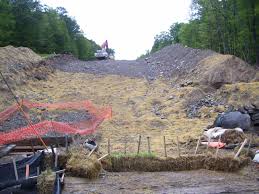Observations on FERC scoping meeting at Bridgeport (3/24/15)
Update by S. Tom Bond, Retired Chemistry Professor & Resident Farmer, Lewis County, WV
The Federal Energy Regularity Commission (FERC) “scoping” public meeting at Bridgeport High School which was held Tuesday, March 24, allowed an observer much to watch. At one level there was an array of arguments offered on each side, for and against the pipelines proposed for getting Marcellus gas to markets several hundred miles away.
At a deeper level there was a rich lode of psychological behavior one could observe. One of the most conspicuous was the deep division between those who wanted to see the fast route out of West Virginia constructed and those who objected on various grounds.
The pros, lets call them, sat on the left side, very largely men. The anti-pipeline people sat on the right. The speakers had to sign up in advance. Speakers for the pros were almost entirely men, corporate executives or paid by the industry, such as subcontractors, a lawyer or two, and a Chamber of Commerce representative. The anti-s included both sexes, a fact recognized by one of the late speakers, who said the number of women could be accounted for by the fact women were “more caring” of family and others. Some of the woman speakers gave very creditable talks.
The pros invariably talked about economic advantages, with a single exception. One claimed energy independence for the U. S. (Nice warm, fuzzy myth, but not true. See the Energy Information Administration’s “U. S. Imports by Country of Origin” ).
U. S. demand actually required 9,387,000 imported barrels of oil in December 2014 and about that much more of our own production. Some pros informed the audience of their family background and involvement with energy extraction. A very few were real working men who talked about their good jobs.
The things the anti-s told FERC ranged from concerns about safety, to property damage, to effects on rivers and streams, concerns about design and location, exaggerated economic claims, effect of the accessories, such as compressor stations, that it will be terrorist target, effect on price of natural gas to local customers, and dozens of other concerns. Backgrounds of the anti-s were quite diverse, too. They included health professionals, farmers, a couple of former college professors, small business people and a couple of people with experience in oil and gas work who had reserves about how it is done.
Some specific complaints were made about economics by the injured. One man complained that he was told the surveyors were coming on his property without being told which one (think of the need to check gates to see cattle don’t get out). When they had finished there was a 30-inch pipeline surveyed to go between his barns (think about what would happen to his cattle the following winter when the backfill was unconsolidated and wet). Another was there would be little if any fire protection from an accidental fire that would affect an area of half to a mile in radius, and more in a dry time. There is no accounting for damage done by pipelines and the fracking to agriculture, forestry, and rural life style at all!
It is quite clear people are divided between those who see the proper role for humanity is to be stewards of the earth and the good things it provides, and those who see the earth as an object for human exploitation. This is reflected in a statement made by one anti. He said “A few minutes ago I heard someone say, ‘This is a cow God wants us to cash in.’ In my experience, someone who says God wants us to do something is really turned around, what he wants is to tell God what to do.”
One pro said “If the pipelines aren’t put in then fracking will never amount to anything in West Virginia.” One speaker who had worked on pipelines talked about the problems with big pipelines under pressure.
So many different takes on the issue, each reflecting someone’s private view of their universe! The “great white elephant in the room,” global warming, wasn’t an issue mentioned by either side.
See also: www.FrackCheckWV.net and www.MAREproject.org and www.WVMatters.com


{ 2 comments… read them below or add one }
FERC Hear This: Pipeline Risks to Rural Folks Too High
In late March, in Elkins and Bridgeport, WV, FERC held two public scoping meetings on the proposed massive Atlantic Coast Pipeline and the Supply Header Pipeline.
Doddridge County resident Christina Woods is a member of the Doddridge County Watershed Association. Christina is also an OVEC member. She was among those quoted in a West Virginia Public Radio story covering the FERC scoping meeting at the Bridgeport meeting on March 24, where she delivered these comments:
My wish for all of you is clean air, clean water and a safe place to live. Water contamination from fracking-related activities is real in Doddridge County.
My home is approximately one mile from the Supply Header Pipeline. The proposed Mountain Valley Pipeline runs parallel to the Supply Header Project in our area. Why would we allow two pipelines so close to one another?
See here: http://ohvec.org/ferc-pipeline-risks/
Concerning the statement made that ”this is how God wants us to cash in”.
Last time I read the Bible it said you cannot serve two masters and for the love of money is the root of all evil. I don’t think bringing God into pipeline deals and greed is a great idea.
I am not to judge but I do find that mentality a bit disturbing.